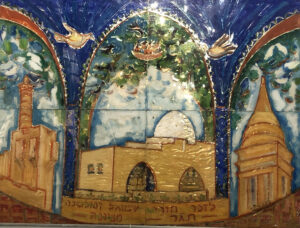
What does it mean to be kadosh, “holy,” or “sanctified”? I always used to think it meant “elevated,” or somehow, “better than” something or someone else. Dictionary.com would certainly have you believe that, but the Hebrew word, kadosh, means “to be set apart.” A Jewish wedding is called kiddushin, meaning that the bride is “set apart” from others, for the groom. I know, in this day and age it doesn’t sit well, but hopefully you get the idea.
This week’s Torah reading, Kedoshim, is often called “The Holiness Code,” and it’s full of brief, specific commandments mostly aimed at how we behave and act towards others. Kedoshim can read like a laundry list of seemingly unrelated, or loosely related, rules, but taken together, they comprise a guideline for ethical behavior towards others, from our parents and children to the “stranger” who lives in our community and everyone in between.
Most famous, perhaps, is Leviticus 19:18; v’ahavta l’ray-akha kamokha, “love your fellow person as yourself.” This verse is understood by our great sage Hillel as, da-alakh snay l’khavrakh, la ta-avayd, “that which is hateful to you, do not do to another.” He continued, “that is the entire Torah, the rest is interpretation. Go study.” (BT Shabbat 31a)
And study is what we’ve been doing since.
Kedoshim’s commandments remind us that we are kadosh because God is kadosh, and by emulating God, we affirm that we, ourselves, and everyone else, are created in that Divine image, with a spark of the Divine within each and every one of us.
“Being holy” means that when we start thinking we’re “something special,” (ok, we are, but so is everyone else) that we remember the two pieces of paper; one that says, “the world was created for my benefit,” and the other, when we get too full of ourselves, “I am but ashes and dust.”
May we be blessed to see the face of God in everyone we meet, and remember that we’re all in this together.









0 Comments